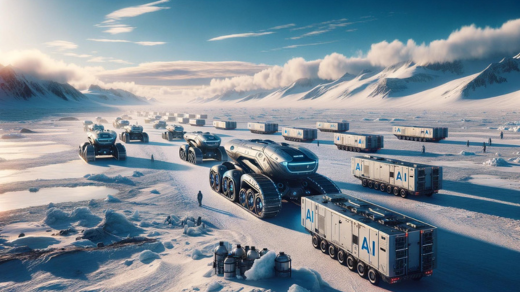Tank trailers play a crucial role in various industries, facilitating the transportation of liquids and gases. Among the innovations in this field, Polar Tank AI stands out as a revolutionary advancement. This article delves into the concept of polar tank AI, its applications, advantages over traditional tank trailers, technological features, market impact, environmental sustainability, regulatory compliance, cost considerations, case studies, future developments, challenges, and training opportunities.
Introduction to Polar Tank
Polar Tank is a leading provider of tank trailers renowned for their quality and reliability. Tank trailers are essential for transporting a wide range of liquids, including chemicals, fuels, and food products, across different industries. These trailers are vital for ensuring the efficient distribution of goods from production facilities to end consumers.
Understanding Polar Tank AI
Polar Tank AI refers to the integration of artificial intelligence (AI) technology into tank trailers to optimize their performance and enhance operational efficiency. By leveraging AI algorithms and advanced sensors, Polar Tank AI can collect, analyze, and interpret data in real-time, enabling predictive maintenance, route optimization, and risk mitigation.
Applications of Polar Tank AI
In the transportation industry, Polar Tank AI finds applications in fleet management, route planning, and cargo monitoring. By harnessing AI-driven insights, companies can optimize fuel consumption, minimize downtime, and improve overall productivity. Moreover, Polar Tank AI enhances safety by providing alerts for potential hazards and optimizing driving behavior.
Advantages of Polar Tank AI Over Traditional Tank Trailers
Compared to traditional tank trailers, Polar Tank AI offers several advantages. It improves operational efficiency by optimizing routes, reducing idle time, and minimizing fuel consumption. Additionally, Polar Tank AI enhances safety through real-time monitoring of vehicle conditions and driver behavior, thereby reducing the risk of accidents and spills.
Technological Features of Polar Tank AI
Polar Tank AI incorporates advanced sensors, telematics systems, and machine learning algorithms. These technologies enable seamless communication between the tank trailer and centralized monitoring systems, allowing for proactive maintenance and performance optimization. Furthermore, Polar Tank AI can analyze historical data to identify patterns and predict potential issues before they occur.
Integration of AI in Tank Trailers
Despite its numerous benefits, the integration of AI in tank trailers poses certain challenges, including data privacy concerns, cybersecurity risks, and the need for specialized training. However, with proper implementation and training, these challenges can be addressed, paving the way for widespread adoption and innovation in the industry.
Market Impact and Adoption of Polar Tank AI
The adoption of Polar Tank AI is steadily increasing across the transportation industry, driven by the growing demand for efficiency, safety, and sustainability. As companies recognize the benefits of AI-driven solutions, they are investing in upgrading their fleets with Polar Tank AI technology to gain a competitive edge in the market.
Environmental Sustainability with Polar Tank AI
One of the significant advantages of Polar Tank AI is its contribution to environmental sustainability. By optimizing routes, reducing emissions, and minimizing fuel consumption, Polar Tank AI helps companies lower their carbon footprint and comply with stringent environmental regulations, thereby promoting a greener and more sustainable transportation ecosystem.
Regulatory Compliance and Safety Standards
In addition to enhancing operational efficiency and sustainability, Polar Tank AI ensures compliance with regulatory requirements and safety standards. By monitoring vehicle performance and driver behavior, Polar Tank AI helps companies adhere to industry regulations and mitigate risks associated with transportation operations.
Cost Considerations and Return on Investment
While the initial investment in Polar Tank AI technology may seem substantial, the long-term benefits far outweigh the costs. By reducing maintenance expenses, minimizing fuel consumption, and enhancing overall productivity, Polar Tank AI offers a significant return on investment for companies in the transportation industry.
Case Studies and Success Stories
Several companies have already experienced the transformative impact of Polar Tank AI on their operations. From improved fleet management to enhanced safety and efficiency, these case studies highlight the tangible benefits of adopting AI-driven solutions in the transportation industry.
Future Developments and Innovation
Looking ahead, the future of tank trailers lies in continued innovation and technological advancements. With ongoing research and development efforts, Polar Tank AI is poised to revolutionize the transportation industry, driving further improvements in efficiency, safety, and sustainability.
Challenges and Limitations
Despite its potential, Polar Tank AI faces certain challenges and limitations, including technological barriers, regulatory hurdles, and integration complexities. However, with collaborative efforts from industry stakeholders and advancements in AI technology, these challenges can be overcome, unlocking new opportunities for growth and innovation.
Training and Education in Polar Tank AI
To fully leverage the benefits of Polar Tank AI, companies must invest in training and education for their employees. By equipping them with the necessary skills and knowledge, companies can maximize the potential of Polar Tank AI technology and ensure its seamless integration into their operations.
In conclusion, Polar Tank AI represents a paradigm shift in the transportation industry, offering unparalleled efficiency, safety, and sustainability. By harnessing the power of artificial intelligence, companies can optimize their fleet operations, reduce costs, and minimize environmental impact, thereby driving innovation and growth in the sector.

